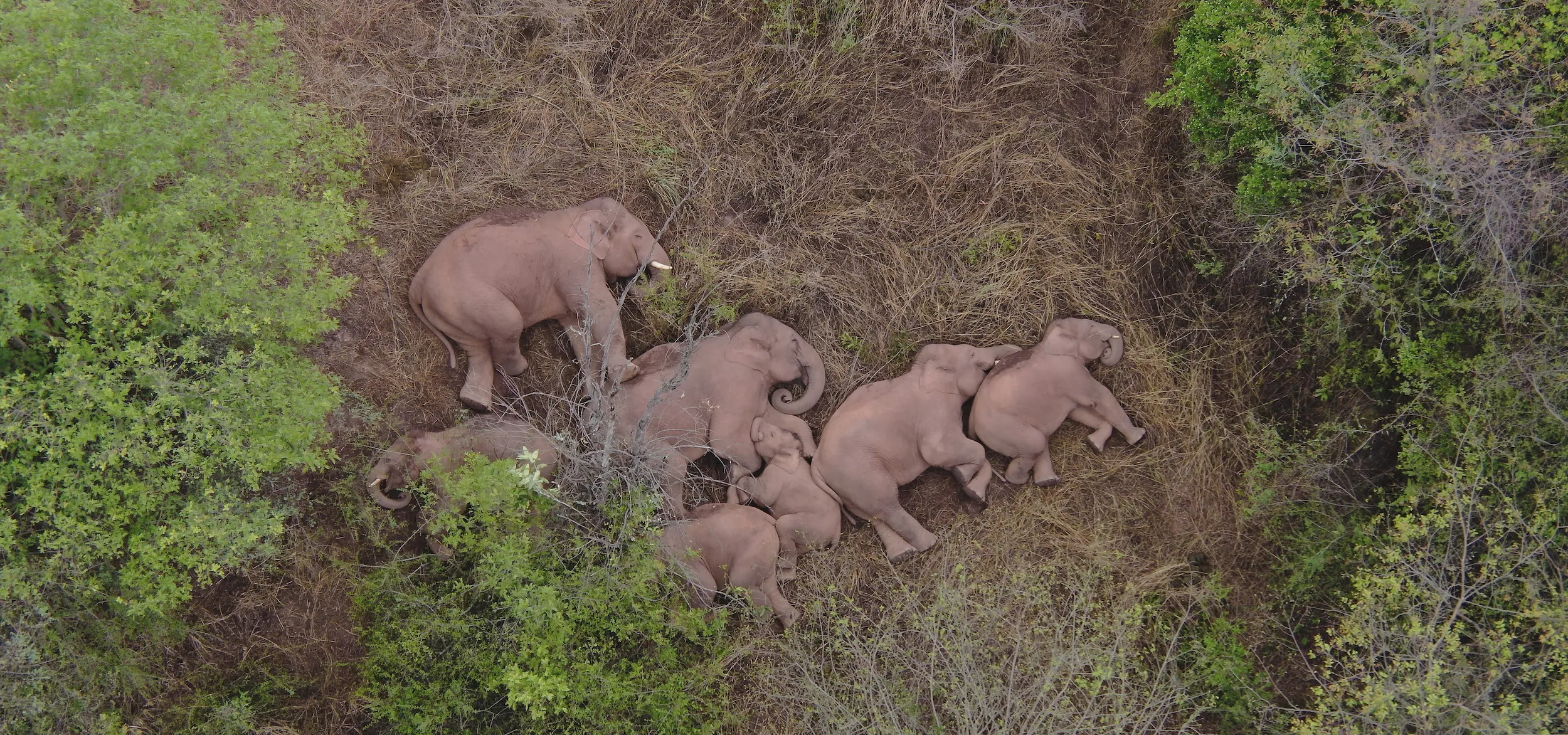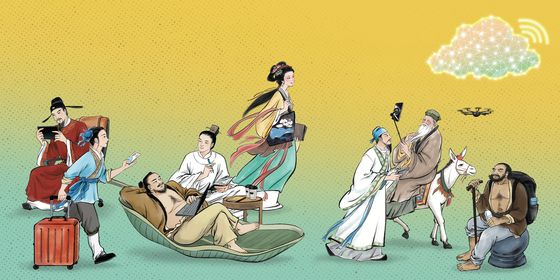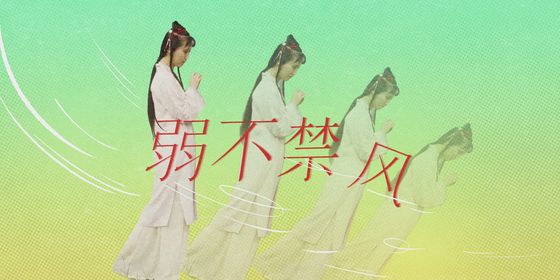Learn essential idioms about elephants from Chinese history
A herd of wild Asian elephants captured media headlines in June this year as they lumbered north across China's southwestern Yunnan province. The elephants' march far from their home brought up important questions about habitat loss and conservation, as much as it captivated audiences worldwide as the herd chomped on acres of crops, wandered through local villages, and even enjoyed some homemade rice wine.
Elephants haven’t always enjoyed such fame in China—they didn’t make it onto the list of 12 zodiac animals. But the (not always) gentle giants left enough of an impression on ancient Chinese to find their way into a few idioms that are still in use today:
象箸玉杯 xiàngzhù-yùbēi
Ivory chopsticks and jade cups
Asian elephants once roamed in China as far north as the Yellow River Basin. The prodigious value of ivory, however, has been the driving force behind the poaching that has brought elephant populations worldwide to dangerously low levels. Chinese people began using ivory perhaps 3,000 years ago. Han Feizi (《韩非子》), an ancient Chinese text attributed to philosopher and statesman Han Fei (280 – 233 BCE), records how King Zhou of the Shang dynasty (1600 – 1046 BCE) , an infamous tyrant, used ivory chopsticks. Though this habit seemed inconsequential, the king’s uncle Jizi (箕子) was worried.
Jizi explained that the use of such lavish utensils put the king on a path to ruin. After using ivory chopsticks, it wouldn’t be long before the king sought plates and cups of jade or rhinoceros horn to replace his common clay bowls. With such delicate dinnerware, he wouldn’t be satisfied with using them to hold ordinary food, and would demand rare meats and top-quality ingredients. By then, the king wouldn’t be happy with eating such exquisite food in a simple dwelling while wearing plain clothes, so he would ask for gorgeous palaces and luxury outfits. “Because I am afraid of how it will end, I am scared of its start (吾畏其卒故怖其始),” Jizi said.
Jizi’s prediction proved correct, and just five years later, King Zhou became completely obsessed with luxury. With his mind clouded by lust for wealth, the king became increasingly ruthless and tyrannical. The Shang dynasty soon collapsed. Later, people began to use "ivory chopsticks and jade cups (象箸玉杯)" to refer to an extravagant lifestyle. For example:
Rich people live life using ivory chopsticks and jade cups, how can they understand the hardship of the poor?
Fùrén men guòzhe xiàngzhù-yùbēi de shēnghuó, zěnme huì lǐjiě qióngrén de jiānxīn?
富人们过着象箸玉杯的生活,怎么会理解穷人的艰辛?
象齿焚身 xiàngchǐ fénshēn
An elephant is killed due to its ivory
Even in ancient times, people realized that the ivory trade was a disaster for elephants, and this chengyu refers to how valuable possessions can turn out to be a curse. In the Spring and Autumn Period (770 – 476 BCE), the State of Jin forced smaller states to pay large tributes into the Jin coffers. The heavy burden took its toll on those weaker states, so Zichan (子产), statesman of the Zheng state, wrote a letter to Shigai (士匄), the ruler of the State of Jin, who was also known as Fan Xuanzi (范宣子):
“I heard that when a gentleman rules a state, he worries about the lack of virtue, not the lack of wealth. If the wealth of the other states was all gathered in Jin, those states would grow apart from you; and if you rely on their wealth to rule, people of your state won’t trust you. If the other states are alienated, Jin will fall. If the people of Jin don’t trust you, you will fall. So, why do you need this wealth?”
Then, to emphasize his point: “Elephants are killed because of their precious tusks. That’s what wealth would bring.” Shigai was won over, and agreed to reduce his demands for tribute. The expression 象齿焚身 subsequently became a chengyu, meaning that wealth could incur misfortune.
Poverty is terrible. But sometimes being rich can also be dangerous since money can incur misfortune, just as elephants are killed for their ivory.
Qióng shì hěn kěpà, dànshi yǒu shíhou yǒu qián yě hěn wēixiǎn, kěnéng huì zhāozhì xiàngchǐ fénshēn de bēijù.
穷是很可怕,但是有时候有钱也很危险,可能会招致象齿焚身的悲剧。
蛇欲吞象 shé yù tūn xiàng
A snake wants to swallow an elephant
According to The Classic of Mountains and Seas (《山海经》), a compilation of mythic geography and beasts believed to have been completed before the Han dynasty (206 BCE – 220), there once lived a type of giant snake called a bashe (巴蛇). The bashe could eat an elephant but, unable to digest the vast animal’s bones, would disgorge the skeleton three years after eating.
The chengyu 蛇欲吞象 refers to the snake's inability to digest the elephant and is used to refer to unlimited greed. The phrase is often used in the structure: “人心不足蛇吞象 (Rénxīn bùzú shé tūn xiàng. A man whose heart is not content is like a snake which tries to swallow an elephant)."
A man whose heart is not content is like a snake trying to swallow an elephant. He won’t stop here. Sooner or later, he will pay the price for his greed.
Rénxīn búzú shé tūn xiàng, tā búhuì jiù cǐ bàshǒu de. Zǎowǎn yǒu yì tiān, tā huì wèi zìjǐ de tānlán fùchū dàijià.
人心不足蛇吞象,他不会就此罢手的。早晚有一天,他会为自己的贪婪付出代价。
众盲摸象 zhòng máng mō xiàng
The blind touching an elephant
This classic idiom comes from a Buddhist story first recorded in the Mahaparinirvana Sutra (《大般涅槃经》), which it is believed was first translated into Chinese during the Eastern Han dynasty (25 – 220). The story relates to several blind men who tried to use touch alone to establish what an elephant looks like. The first man approached the elephant and felt its tusk, and concluded the elephant was like a turnip. The second touched the elephant’s ear, and said that it must be like a dustpan. The third touched the elephant’s tail, and argued that it was therefore like a snake; and so on. They all debated with each other but couldn’t agree on what the elephant was actually like.
This story was then summarized into a chengyu, 众盲摸象 (many blind people touching an elephant), describing a failure to see the whole picture.
If we just guess what happened without knowing the causes behind the matter, we will be just like the blind who touch the elephant, and cannot solve the problem.
Rúguǒ wǒmen bù zhīdào shìqíng de qányīn-hòuguǒ, zhǐshì xiā cāi, nà jiù shì zhòng máng mō xiàng, jiějué bù liǎo shíjì wèntí.
如果我们不知道事情的前因后果,只是瞎猜,那就是众盲摸象,解决不了实际问题。












